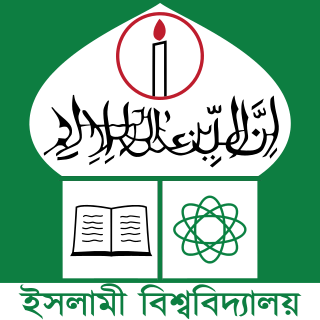
Bangladesh, officially the People's Republic of Bangladesh, is a country in South Asia. It is the eighth-most populous country in the world and among the most densely populated with a population of 170 million in an area of 148,460 square kilometres (57,320 sq mi). Bangladesh shares land borders with India to the north, west, and east, and Myanmar to the southeast. To the south, it has a coastline along the Bay of Bengal. To the north, it is separated from Bhutan and Nepal by the Siliguri Corridor, and from China by the mountainous Indian state of Sikkim. Dhaka, the capital and largest city, is the nation's political, financial, and cultural centre. Chittagong is the second-largest city and the busiest port. The official language is Bengali, with Bangladeshi English also used in government.

Dhaka, formerly known as Dacca, is the capital and largest city of Bangladesh. It is the ninth-largest and eighth-most densely populated city in the world with a density of 23,234 people per square kilometer within a total area of approximately 300 square kilometers. Dhaka is a megacity, and has a population of 10.2 million residents as of 2024, and a population of over 23.9 million residents in Dhaka Metropolitan Area. It is widely considered to be the most densely populated built-up urban area in the world. Dhaka is the most important cultural, economic, and scientific hub of Eastern South Asia, as well as a major Muslim-majority city. Dhaka ranks third in South Asia and 39th in the world in terms of GDP. Lying on the Ganges Delta, it is bounded by the Buriganga, Turag, Dhaleshwari and Shitalakshya rivers. Dhaka is also the largest Bengali-speaking city in the world.

The economy of Bangladesh is a major developing mixed economy. As the second-largest economy in South Asia, Bangladesh's economy is the 35th largest in the world in nominal terms, and 25th largest by purchasing power parity. Bangladesh is seen by various financial institutions as one of the Next Eleven. It has been transitioning from being a frontier market into an emerging market. Bangladesh is a member of the South Asian Free Trade Area and the World Trade Organization. In fiscal year 2021–2022, Bangladesh registered a GDP growth rate of 7.2% after the global pandemic. Bangladesh is one of the fastest growing economies in the world.

In politics, humanitarian aid, and the social sciences, hunger is defined as a condition in which a person does not have the physical or financial capability to eat sufficient food to meet basic nutritional needs for a sustained period. In the field of hunger relief, the term hunger is used in a sense that goes beyond the common desire for food that all humans experience, also known as an appetite. The most extreme form of hunger, when malnutrition is widespread, and when people have started dying of starvation through lack of access to sufficient, nutritious food, leads to a declaration of famine.

Muhammad Yunus is a Bangladeshi economist, entrepreneur, politician, and civil society leader, who has been serving as the 5th Chief Adviser of the interim government of Bangladesh since 8 August 2024. Yunus was awarded the Nobel Peace Prize in 2006 for founding the Grameen Bank and pioneering the concepts of microcredit and microfinance. Yunus has received several other national and international honors, including the United States Presidential Medal of Freedom in 2009 and the Congressional Gold Medal in 2010.

Bangladesh Agricultural University, abbreviated as BAU, was established in 1961. It is the first agricultural university and also the second largest public university of Bangladesh. This university is located in Mymensingh. The university has 44 departments.

Muhiuddin Khan Alamgir is a Bangladeshi politician. He is a Jatiya Sangsad member representing the Chandpur-1 constituency since 2008, and was Minister of Home Affairs from 2011 to 2013. He is also an economist, civil servant, and writer in Bangladesh.

Food safety in China is a widespread concern for the country's agricultural industry and consumers. China's principal crops are rice, corn, wheat, soybeans, and cotton in addition to apples and other fruits and vegetables. China's principal livestock products include pork, beef, dairy, and eggs. The Chinese government oversees agricultural production as well as the manufacture of food packaging, containers, chemical additives, drug production, and business regulation. In recent years, the Chinese government attempted to consolidate food safety regulation with the creation of the State Food and Drug Administration of China in 2003; officials have also been under increasing public and international pressure to solve food safety problems. Chinese Vice Premier Li Keqiang said, "Food is essential, and safety should be a top priority. Food safety is closely related to people's lives and health and economic development and social harmony," at a State Council meeting in Beijing.

Islamic University, Bangladesh ; commonly referred to as Islamic University, Kushtia shortly IU, is a public PhD granting research university in Kushtia, Bangladesh and the largest seat of higher education in the south-west part of the country. This university in Bangladesh stands as the sole institution offering a unique program in Theology, alongside seven other academic divisions/faculties: Engineering and Technology, Humanities, Social Sciences, Sciences, Biological Sciences, Business Administration, and Law, all coexisting within a diverse and multicultural environment. It is financed by the Government of Bangladesh through University Grants Commission, Bangladesh. On 22 November 1979, the foundation of the Islamic University was set up in Kushtia, and it is operated under the Islamic University Act of 1980. Islamic University began operations on 28 June 1986. It holds the distinction of being the seventh most ancient educational institution in the nation, serving as Bangladesh's inaugural university post-independence from Pakistan in 1971. It offers undergraduate, graduate, M Phil and PhD degrees.

Agriculture is the largest employment sector in Bangladesh, making up 14.2 percent of Bangladesh's GDP in 2017 and employing about 42.7 percent of the workforce. The performance of this sector has an overwhelming impact on major macroeconomic objectives like employment generation, poverty alleviation, human resources development, food security, and other economic and social forces. A plurality of Bangladeshis earn their living from agriculture. Due to a number of factors, Bangladesh's labour-intensive agriculture has achieved steady increases in food grain production despite the often unfavorable weather conditions. These include better flood control and irrigation, a generally more efficient use of fertilisers, as well as the establishment of better distribution and rural credit networks.
Grameen Danone Foods, popularly known as Grameen Danone, is a social business enterprise, launched in 2006, which has been designed to provide children with many of the key nutrients that are typically missing from their diet in rural Bangladesh. It is run on 'No loss, No dividend' basis. Initially, Grameen Danone agreed to pay an annual dividend of one percent to shareholders, however, in December 2009, the board of Grameen Danone agreed to waive any monetary return.

Naiyyum Choudhury was a Bangladeshi biotechnologist and a nuclear scientist. He pioneered the development and adoption of the National Biotechnology policy of Bangladesh. He served as the Chairman of Bangladesh Atomic Energy Commission, and also served in many important positions in Bangladesh. He was serving as the founding Chairman of Bangladesh Atomic Energy Regulatory Authority (BAERA) at the time of his death. He was the Chairman of the Department of Microbiology, Dhaka University, Professor and Coordinator of Biotechnology at BRAC University, and served as faculty member in Jahangir Nagar University and BUET. He was also the IAEA Regional Cooperation Agreement (RCA) Chair person. He was also a fellow of Bangladesh Academy of Sciences (BAS), and was serving as the Vice President of BAS at the time of his death. He was also the contact person for Inter Academic Panel (IAP) of Bangladesh.

Bangladesh is one of the most populous countries in the world, as well as having one of the fastest growing economies in the world. Consequently, Bangladesh faces challenges and opportunities in regards to public health. A remarkable metamorphosis has unfolded in Bangladesh, encompassing the demographic, health, and nutritional dimensions of its populace.
Despite India's 50% increase in GDP since 2013, more than one third of the world's malnourished children live in India. Among these, half of the children under three years old are underweight.
Integrated Child Development Services (ICDS) is a government program in India which provides nutritional meals, preschool education, primary healthcare, immunization, health check-up and referral services to children under 6 years of age and their mothers. The scheme was launched in 1975, discontinued in 1978 by the government of Morarji Desai, and then relaunched by the Tenth Five Year Plan.
Bangladesh is one of the most vulnerable nations in the world due to climate change. As the ninth most populous country and twelfth most densely populated countries in the world, its rising population and limited land space have put tremendous strains on the urban ecosystem. The capital of Dhaka itself underwent severe transformations in recent years to catch up the increased rate of urbanisation. This change was paralleled by a boom in the real estate, construction and housing industry. According to United Nations Population Fund (UNFPA), Dhaka is one of the most polluted cities in the world.
Sport in Bangladesh is a popular form of entertainment as well as an essential part of Bangladeshi culture. Cricket is the most popular sport in Bangladesh followed by football. Kabaddi is the national sport of Bangladesh.

The Ministry of Health and Family Welfare is a Bangladesh government ministry charged with health policy in Bangladesh. It is also responsible for all government programs relating to family planning in Bangladesh. The present adviser is Nurjahan Begum. The Ministry of Health and Family Welfare contains two divisions: Health Service Division and Medical Education And Family Welfare Division.
E-commerce in Bangladesh refers to the electronic commerce sector of Bangladesh business.
USAID is a government agency of United States that works globally for extreme poverty, education, women's empowerment, global health and other issues. USAID also works in Bangladesh. They help in many sectors around Bangladesh. USAID became partner with it since 1971. Since then, it helping Bangladesh for gaining a status of being a middle income country by its 50th year of independence in 2021. The current mission director of USAID in Bangladesh is Janina Jaruzelski.











